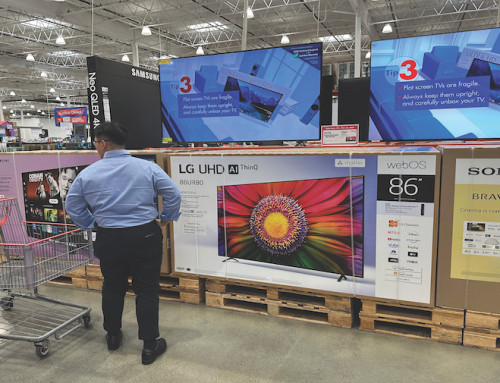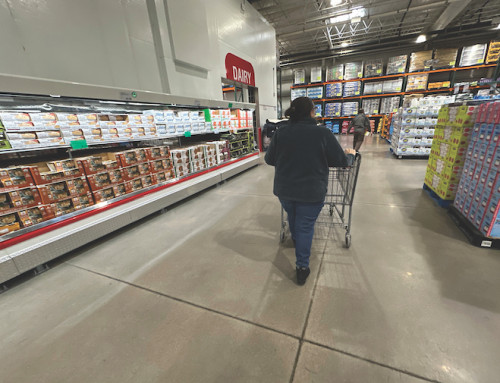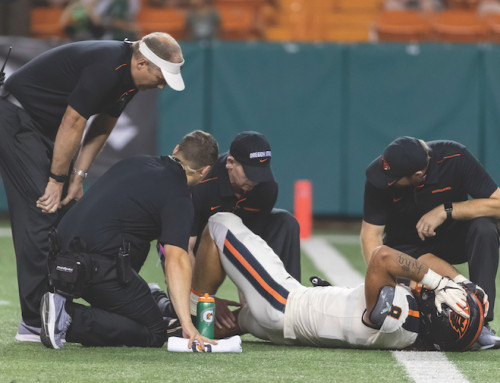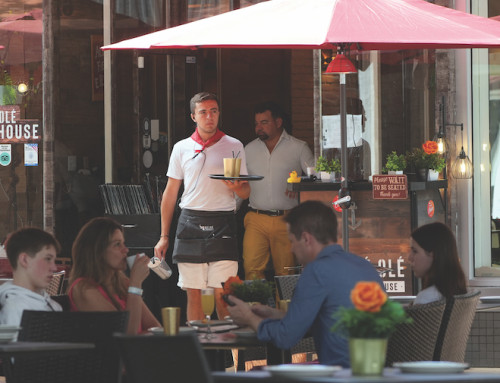Allison Chapman, owner of Igloo Letterpress, never envisioned her career as it exists now.
As a history major in college with an interest in antique printing techniques, she thought she would end up in a career having to do with history.
And in a sense, she has. It’s just that her trade revolves around and echoes her own history, a personal story turned business that Chapman says she never takes for granted.
“I never expected this to be my business,” Chapman said.
As a young girl growing up in Missouri, Chapman developed an interest in printing when her grandfather noticed an old press in a neighbor’s barn and asked if he could tinker with it.
“As a grandchild, I was always really interested in any project he was working on and I wanted to be a part of it and get my hands in there and he was always very indulgent,” she said.
Eventually, birthday invitations would be printed on the antique press. If Chapman had a school project she was working on, her grandfather would help her with design and printing.
“As a kid, he reinforced for me that what I was working on had value and I should put it out there,” Chapman said. “I realize now that, as an adult, it had a huge influence on me.”
Chapman eventually inherited the press from her grandfather and kept it in her basement.
“As soon as I got to college, I realized how unusual it was to have a printing press in my basement,” she said.
Although she was a history major, she found herself spending a lot of time working on projects in the art department where there were more printing presses and a professor who encouraged her involvement and experimentation.
After college, Chapman worked at the Minnesota Center for Book Arts as an administrator and a teacher.
“Being exposed to such a high level of artistry and craft, that was a great training ground to show me the best work that was possible and it challenged me to become a better printer and become critical of my design work,” she said.
In 2008, Chapman and her family moved to Columbus due to her husband’s job and she had a baby shortly thereafter. After a recovery year during which the family got used to their new structure and surroundings, Chapman said she began thinking seriously about what her role would be in Columbus.
As it happened, they had not found a house that could hold the printing presses, so Chapman was forced to find a studio space outside of the home for the first time.
Enter Igloo Letterpress.
“In 2009, I moved into our studio on New England Avenue and we were there for six years,” Chapman said. “I could do my favorite things — teach classes, do work for customers, build my product line. That was the goal.”
Igloo Letterpress, which takes its name from what the family dubbed their former home in snowy Minnesota, is now located on High Street in Worthington and offers classes on printing and bookbinding, products from greeting cards to journals and a space for local artists to use the rare equipment.
“We’ll always offer classes for adults and kids to work together,” Chapman said. “That’s a key part of the Igloo story because of how I learned with my grandfather and my kids are always around here as well.”
Other classes include calligraphy, leather work and wood type.
Artists can use the equipment for their own projects and businesses can order one-of-a-kind business cards and note cards. The studio even has a residency program for visiting artists.
Still, it’s a niche business for sure and one that comes with its own set of challenges, but Chapman says that the uniqueness of her business has allowed her to develop some interesting relationships that she wouldn’t have otherwise.
“As in anything, certainly in the last 20 years that I’ve been working in this field, digital printing and other processes have become the norm and people aren’t ordering print as much as they used to,” she said.
“As counterintuitive as it seems, we benefit from that because when people have an heirloom project or something so specific that they are working on, we are able to provide a level of service that is unusual — the options that we can provide because we handmake things, the quality of the print so that you can feel the impression on the paper, that ability to make so many personalized choices about products — it’s both the end product and the process that matter here.”
The studio has an adjoining shop so one of the things that was built into the space is the visibility of the presses so people can not only appreciate the quality of the work but also get an education and see the process.
Of course, antique equipment also presents some unique hurdles.
“No one makes these presses anymore,” Chapman said, “so we are fortunate to have made contacts with other printers, with people who have warehouses of remaining parts and pieces left over.”
But even those relationships aren’t always quite enough and Chapman said that one of the great things about being in Columbus is the community of artists and makers in the city.
When a bolt on one of the presses recently broke, for example, she said that they could not find a replacement part in order to fix the press.
The Columbus Idea Foundry, located in Franklinton, stepped in to machine the necessary bolt.
“Where else are you going to find that?” Chapman said.
According to Chapman, the business attracts people from all walks of life.
During a recent class she asked participants how they heard of the place. Some said they saw the equipment while visiting the gift shop.
“The studio shop was the gateway drug,” Chapman said. “We also had a gentleman who had been doing some writing and he Googled ‘bookbinding’ and we came up.
“It’s like a field of dreams, if you build it they will come,” she continued. “People who are interested in paper and printing and books, they will find us.”
For now, Chapman plans on keeping the business at its current size with no plans to open another location.
“We are one igloo,” she says.
But one of her goals is to develop even deeper ties within the community.
“I’ve been thinking about new goals and a lot of those center around developing our product line and our role as a business in the community, partnerships with other businesses and nonprofits in Columbus and making sure that we support each other’s work,” she said. “We have a very engaged local audience and I appreciate that loyalty.”
Even though she says that she never envisioned being where she is, Chapman now says that she wouldn’t have it any other way.
“I think all my dreams came true,” she said. “While this is not the end business I had in mind, I’m very thankful that the presses got kicked out of the house. I can’t imagine doing anything else.”








